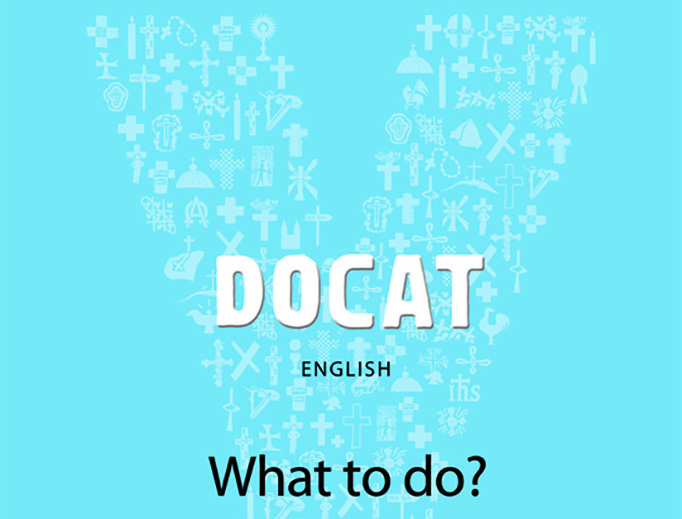DOCAT: Helping Young People (and All of Us) Know What to Do

Tired but buoyant, an estimated three million young people are heading home from Krakow, Poland, where they joined Pope Francis for a week of prayer and worship and learning and song at World Youth Day 2016. And tucked into their backpacks is a new little paperback, the DOCAT.
DOCAT: What to Do?, just released by Ignatius Press and the Augustine Institute, is the sequel to YOUCAT, the hugely popular Youth Catechism that's based on the Catechism of the Catholic Church. DOCAT explains the social teaching of the Catholic Church in a way that seems relevant to youth, but it's a helpful tool for all of us! Drawing on Scripture, YOUCAT, the Catechism of the Catholic Church, and the Compendium of Catholic Social Teaching, DOCAT is written with help from church and business leaders, social activists and young people.
Pope Francis wrote the forward for the book, which was officially released on Tuesday, July 26. In his introduction, Pope Francis explained the book and encouraged young people to let it lead them to transform society by their love and their action. He wrote:
The English verb “to do” is part of the title. DOCAT answers the question: “What should we do?”; it is like a user's manual that helps us to change ourselves with the Gospel first, and then our closest surroundings, and finally the whole world....
Dear young friends! Only conversion of heart can make our world, which is full of terror and violence, more humane. And that means patience, justice, prudence, dialogue, integrity, solidarity with victims, the needy, and the poorest, limitless dedication, love even unto death for the sake of the other. When you have understood that quite deeply, then you can change the world as committed Christians. The world cannot continue down the path that it is taking now. If a Christian in these days looks away from the need of the poorest of the poor, then in reality he is not a Christian!...
When I invite you all now really to get to know the social doctrine of the Church, I am dreaming not just about groups that sit under trees and discuss it. That is good! Do that! My dream is of something greater: I wish I had a million young Christians or, even better, a whole generation who are for their contemporaries “walking, talking social doctrine.” Nothing else will change the world but people who with Jesus devote themselves to it, who with him go to the margins and right into the middle of the dirt. Go into politics, too, and fight for justice and human dignity, especially for the poorest of the poor. All of you are the Church. Make sure, then, that this Church is transformed, that she is alive, because she allows herself to be challenged by the cries of the dispossessed, by the pleading of the destitute, and by those for whom nobody cares.
DOCAT uses the popular Q-and-A format, using illustrations and short, to-the-point answers to impart information. In the section on new media, for example, are questions like:
- What is the Church's attitude toward the social networks?
- What is the “digital divide”?
- What is the right way to use the media?
- What does ideal communication on the Internet look like?
- And more....
On the subject of abortion, the DOCAT asks (partial listing):
- When does a human being start to be a person?
- Why does the Church reject abortion in principle?
- What can be done to help a woman who has become pregnant after a rape?
- What about pre-implantation diagnosis (PID)?
Following those questions and short answers are quotes from Church documents concerning the topic, and young people can go directly to the original sources to learn more.
There are inspirational and insightful quotes from Catholic leaders and saints, including St. John Paul II, Mother Teresa, Pope Francis and Pope Benedict, with some surprises: Blaise Pascal, Albert Einstein, and—really!—Bruce Willis.
Through the DOCAT App, young people will be able to start groups, participate in discussions and commit on the spot to study DOCAT and to do acts of justice as a present to the Pope.
“A Christian who is not a revolutionary,” says Pope Francis, “is no Christian.” DOCAT helps young people to meet the challenge.












